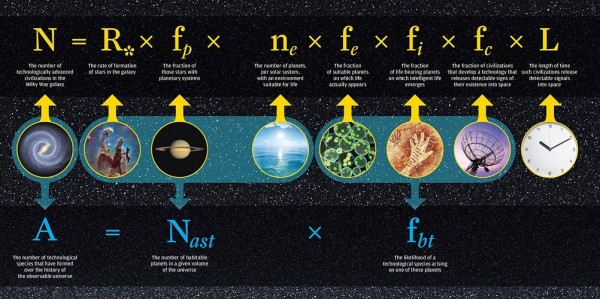By Ana Verayo, | May 02, 2016

There is a one in 10 billion trillion chances of intelligent life on another planet according to this new study.
Scientists and astronomers have been in the quest for finding clues about intelligent life somewhere in the universe, especially alien civilizations that still exist or have existed and if they ever attempted to communicate.
However, in a new study, scientists have devised a simple equation that can answer this constant mystery about extraterrestrial life on other planets with the help of recent discoveries of exoplanets near our solar system. Results reveal that alien civilizations were once abundant in the universe but now they might be all extinct.
Like Us on Facebook
According to lead author of the study, Adam Frank from the University of Rochester, the existence of advanced alien life has three major questions involving the Drake equation which is a probable estimation of the number of active, communicative extraterrestrial civilizations in the Milky Way galaxy.
Frank says that even if there is already an estimated long lifespan of the known stars in the universe, the most uncertain ones involve how many exoplanets can harbor potential life and how fast these worlds can evolve and create intelligent life, including the span of these civilizations' survival before they die out.
Frank adds that NASA's Keppler Space Telescope data and other sky surveys are crucial for one fifth of stellar systems' discovery of habitable zones, where planets are located at a temperate distance from their host star to support life. To answer how long can these civilizations can survive, the team is still figuring out the data and equations and if they can answer a pivotal question involving if humans are the only intelligent race in the galaxy that possesses technological capabilities, the answer would be fairly simple.
According to co-author of the study, Woodruff Sullivan from the University of Washington, the probability of advanced life developing on an exoplanet can be derived from the number of known stars. This would result in a chance of one in 10 billion trillion, or one in 60 billion stars in the Milky Way galaxy.
This one in 10 billion trillion proves to be a very slim chance that there would be other life on distant planets even in our own galaxy. Frank also says that since the universe is so vast and continuously growing, it can be almost impossible to compute the length of civilizations including the chances of communicating with an intelligent species in that span of time.
Frank explains that other intelligent species that possesses technological capabilities have most likely evolved before us, which gives an idea about this one chance in 10 billion trillion, implying that this length of time is equal to human evolution occurring about 10 billion times over the course of cosmic evolution.
Humans on Earth have been existing for 10,000 years across evolution and have been building civilizations in a span of the universe's 13 billion years of existence. Other intelligent life would have been extinct by then.
This new study can also shed new light on how to preserve the human race and to explore survival techniques via computer models and simulations, to determine how alien civilizations maintain their longevity. This new study is published in the journal Astrobiology.
-
Use of Coronavirus Pandemic Drones Raises Privacy Concerns: Drones Spread Fear, Local Officials Say

-
Coronavirus Hampers The Delivery Of Lockheed Martin F-35 Stealth Fighters For 2020

-
Instagram Speeds Up Plans to Add Account Memorialization Feature Due to COVID-19 Deaths

-
NASA: Perseverance Plans to Bring 'Mars Rock' to Earth in 2031

-
600 Dead And 3,000 In The Hospital as Iranians Believed Drinking High-Concentrations of Alcohol Can Cure The Coronavirus

-
600 Dead And 3,000 In The Hospital as Iranians Believed Drinking High-Concentrations of Alcohol Can Cure The Coronavirus

-
COVID-19: Doctors, Nurses Use Virtual Reality to Learn New Skills in Treating Coronavirus Patients







